Teen Acne, School Pressure & Nonstop Pimples? Try These 7 Natural Remedies for Clear, Healthy Skin
Introduction
- Teenage skin is difficult to manage.
- Teen Acne Remedies It’s no wonder that many teenagers battle with acne on a daily basis given the combination of school pressure, hormonal fluctuations, late-night study sessions, junk food temptations, and social media comparisons.
- Teen acne can influence more than just your skin, whether it manifests as an oily T-zone that won’t go away, a painful pimple before a class photo, or breakouts that seem to happen overnight. It can undermine your self-esteem, have an impact on your mood, and make routine situations seem overwhelming.
- The good news is that you can achieve clear skin without using harsh chemicals or costly procedures. Natural therapies are mild, efficient, and work with your body rather than against it.

- These easy, safe, and teen-friendly treatments are supported by both Ayurveda and contemporary research.
- We’ll look at seven natural solutions in this blog that don’t use skincare products. These are root-level, habit-based adjustments that help minimize acne, soothe inflammation, and bring back your skin’s natural radiance without harming your skin barrier or producing negative side effects.
- Start right here if you’re prepared to bid adieu to your regular breakouts and welcome to skin that is clear, healthy, and self-assured.
- One habit at a time, let’s explore the seven natural strategies for treating teenage acne.
DIY Herbal Face Spray: Calm Inflammation & Refresh Instantly
- Teen acne isn’t just a surface-level problem — it’s a combination of hormones, sweat, stress, and sometimes poor skincare habits. One of the gentlest ways to fight pimples is by using a natural herbal face spray.
Why Face Sprays Help Acne-Prone Teen Skin
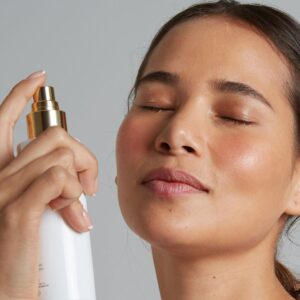
- When your skin is exposed to sweat, dust, and school-time stress, your pores get clogged. Herbal face sprays work as light hydrators and anti-inflammatory mists, calming the skin while keeping it refreshed throughout the day.
- A good herbal spray (made with ingredients like multani mitti, neem powder, sandalwood powder, tulsi, or turmeric) can act as a natural astringent — tightening pores and controlling oil without any harsh chemicals. Unlike toners that may sting or dry out skin, herbal sprays are mild and safe for daily use.
- Backed by Science, Loved by Ayurveda
- Neem, tulsi, and rose are just a few of the herbs that have been shown to have antibacterial and anti-inflammatory qualities. Ayurvedic skincare principles state that employing cooling herbs helps restore equilibrium because heat (or “pitta”) imbalance frequently causes pimples.
- Propionibacterium acnes and other bacteria that cause acne are susceptible to the potent antibacterial properties of neem. Multitani mitti absorbs extra oil, while tulsi reduces redness and inflammation.
- How to Make It at Home
- Add one teaspoon of sandalwood or neem powder to rose water.
- After letting it sit for the entire night, filter it into a spray bottle.
- Apply it to your face two or three times a day, such as after school, after working out, or on hot, muggy days.
- Tip: Always shake before use and store it in the refrigerator for up to 5 days for freshness.
- Real-Life Experience
- Teens who use herbal face sprays into their skincare regimens report a discernible decrease in oiliness and a decrease in fresh breakouts, particularly on the cheeks and forehead.
- Teenagers who require a midday skin reset and are constantly on the go may find it very beneficial.
- One of the most underutilized yet successful treatments for acne is the use of natural face sprays.
- They soothe, heal, and hydrate skin without introducing harsh substances or blocking pores.
- They produce a discernible variation in texture and tone when applied regularly.
- The best part is that they’re inexpensive, easy to do yourself, and entirely natural, which is exactly what adolescent skin needs.
2. Pure Rose Water Toning: Balance & Hydrate Naturally
- When acne-prone teenage skin feels irritated, oily, or tight — rose water is often the simplest yet most powerful solution.
- Pure rose water works as a natural toner, hydrator, and mood-lifter, making it a perfect daily companion for teens dealing with school stress and recurring breakouts.
Why Rose Water Is a Must for Teen Skin
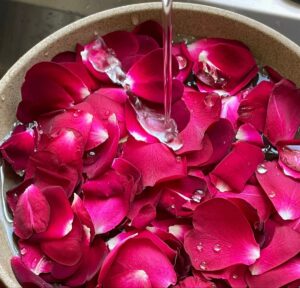
- Hormonal changes in teenagers frequently result in increased sebum production.
- When germs and dead skin cells combine with this extra oil, plugged pores and breakouts result.
- Frequent toning with rose water tightens pores, balances the pH of the skin, and minimizes oil-induced shine without depriving the skin of its natural moisture content.
- Teen Acne Remedies Pure rose water is mild and calming, in contrast to alcohol-based toners that can make you dry, red, or sensitive.
- It is perfect for red, irritated acne or heat-related breakouts since it cools the skin and reduces inflammation, especially during tests or athletic practice.
- The Science Behind the Scent:
- Antioxidants and phenolic chemicals found in rose water help lessen oxidative stress on the skin.
- Dermatological research indicates that rose extract possesses moisturizing, anti-inflammatory, and mild antibacterial qualities.
- Additionally, it has vitamins A, C, D, and E, which promote skin regeneration and healing.
- According to Ayurveda, rose (also called “Gulab”) is a natural coolant and pitta-pacifier, making it perfect for acne brought on by internal heat or emotional stressors like scholastic pressure or performance anxiety.
- How to Use Rose Water for Acne-Prone Skin
- There are two easy methods to use rose water:
- As a toner: Use a gentle cotton pad or spray bottle to dab it onto your skin after cleansing.
- As a refresher: When your skin feels oily or worn out during the day, spray it straight onto your face.
- Use only pure steam-distilled rose water, devoid of any other scents or preservatives, for optimal results. The finest choices are typically those brands that specify “Rosa Damascena” as the only ingredient.
- Pro tip: For a cooling effect that helps lessen inflammation and puffiness, keep it in the refrigerator.
- There are two easy methods to use rose water:
- Real Experience from Teen Users
- Many teenagers who use rose water toning report improved oil control, especially on the T-zone (the forehead, nose, and chin), fewer pimples, and less redness in their face.
- Teenagers who don’t want a lengthy skincare regimen but nonetheless want noticeable results will find it very useful.
- In order to improve product absorption and lessen irritation, some people even use it as a basis before applying aloe gel or acne cream.
- Rose water is the one item that every adolescent with acne should have on their study table or in their school bag.
- It’s nature’s toner—gentle, inexpensive, and effective.
- Rose water helps keep your skin clear, balanced, and free of breakouts if you use it often. It’s self-care that feels peaceful and has a rose scent, not just skincare.
3. Cut the Junk Food: Clean Eating Equals Clean Skin
- Let’s be honest: junk food frequently serves as a quick fix when you’re anxious about your social life, school, or tests.
- However, the majority of teenagers are unaware that your skin is a reflection of your internal health.
- Although processed, greasy, and sugary foods may taste delicious, they may be contributing to your acne more than you realize.
The Real Connection Between Food & Acne

- Teenage skin is already under duress – shifting hormones boost oil (sebum) production, which can clog pores and trigger breakouts. Processed junk food, such as chips, chocolates, burgers, and sodas, raises insulin levels and causes internal inflammation.
- Elevated insulin levels promote increased oil production and raise the risk of blackheads, clogged pores, and flare-ups of acne.
- High-glycemic-index diets, which include refined and sugary carbohydrates, are strongly associated with an increased incidence of acne, according to recent dermatological research. Additionally, these foods encourage the release of IGF-1 (Insulin-like Growth Factor), a hormone that overactivates oil glands and exacerbates acne.
- Experience Speaks: What Teens Notice After Ditching Junk
- Adolescents who adopt a healthier diet that includes more fruits, vegetables, whole grains, nuts, and lean proteins frequently report:
- Smaller and fewer breakouts
- Reduced skin oiliness
- Skin tone that is more uniform
- Reduced bloating and increased vitality
- Many remark that their face feels “lighter” and “less greasy” just a week after taking out chips, cheese-filled snacks, and sugary drinks.
- Adolescents who adopt a healthier diet that includes more fruits, vegetables, whole grains, nuts, and lean proteins frequently report:
- Backed by Ayurveda & Modern Science
- Acne (Yuvana Pidaka) is said by Ayurveda to be caused by an imbalance between pitta (heat) and ama (toxins). Junk food produces toxins from poorly digested packaged foods as well as heat from fried and spicy dishes.
- Dermatology nowadays supports this. Leafy greens, almonds, and curd are examples of foods high in antioxidants, omega-3 fatty acids, and probiotics that help combat internal inflammation that manifests as acne.
- Start with your food if you’re serious about having clear skin. Although skincare products can help on the outside, the acne cycle is directly impacted by what you put into your body.
- Making your skin feel good from the inside out is what clean eating is all about, not about giving up fun.
- Thus, consider this the next time you’re going for chips: “Is this nibble worth the breakout?
4. One Sport, Daily Sweat: Let Your Skin Breathe
- Due to their busy schedules, computer time, and stress from school, most teenagers forget that exercise is important for their skin in addition to their overall health.
- Your skin’s clarity and general glow can be greatly improved by participating in one sport each day or making a commitment to regular exercise. Yes, sweating properly can help prevent acne.
Why Sweat Helps Acne-Prone Skin

- Your body uses sweating as a natural detoxification mechanism.
- Sweating during exercise or sports helps to enhance blood circulation, open up your pores, and eliminate toxins and debris that have accumulated.
- This removes dead skin cells and acne-causing germs that frequently accumulate on the skin’s surface and block pores.
- Additionally, regular exercise helps regulate hormones, especially the stress hormone cortisol, which is a key cause of acne in teenagers.
- A quick 30-minute workout, such as dancing, swimming, football, or basketball, can lower cortisol levels and reduce inflammation of the skin in general.
- Science + Skin: The Link Between Movement and Glow
- Dermatologists claim that exercise improves blood flow, which helps give skin cells more oxygen and nutrients. This aids in:
- Quicker healing of acne
- Decreased puffiness and redness
- Increased synthesis of collagen
- Skin tone that is more uniform
- Additionally, exercise lowers the rise in androgens (male hormones) that trigger oil glands to overproduce sebum, a primary cause of teenage acne, and helps control insulin sensitivity.
- But What About “Sweat Acne”?
- It’s a legitimate worry. Sweating aids in pore cleansing, but it’s crucial to wash your skin as soon as you finish exercising or playing sports. Sweat pimples or folliculitis (inflammation of the hair follicles) can result from perspiration that is left on your face and combined with dust, bacteria, or makeup.
- Expert advice for young athletes:
- Avoid wearing makeup when playing sports.
- After practice, use a moist cotton cloth or rose water to wipe your face.
- Get out of your sweaty clothes right away.
- After working out, take a shower within 30 minutes.
- Real Teen Experience
- Many teenagers claim that even playing one school sport, even if it’s only three times a week, increased their self-confidence in their skin and body.
- They observed fewer flare-ups of acne, as well as improved mood and sleep, two additional acne-fighting advantages of regular exercise.
- Alternatives like skipping, cycling, dance workouts, or brisk evening walks are frequently just as effective for teens who don’t enjoy traditional sports.
- Sometimes all that is needed to treat teenage acne is a little perspiration and movement.
- Your skin can breathe, de-stress, and detox if you play a sport or engage in any other physical activity on a daily basis. It’s a treatment that acts deeply within as well as externally.
- Put on your shoes if you want long-lasting, natural results; your skin will appreciate it.
5. Use Only Soft Cotton to Cleanse Your Face
- It may seem straightforward, even apparent, but the products you use to cleanse or dry your face can either help or hinder your acne’s ability to heal. Rough textiles, shared napkins, and harsh towels can harbor bacteria and aggravate the delicate skin of teenagers. One of the most underappreciated yet successful acne-control practices is to use a soft, clean cotton cloth for your face.
Why Fabric Choice Matters for Acne-Prone Skin
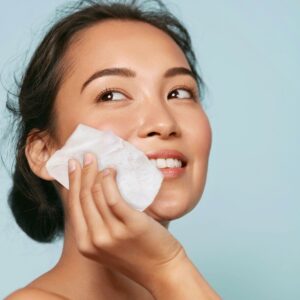
- It may seem straightforward, even apparent, but the products you use to cleanse or dry your face can either help or hinder your acne’s ability to heal.
- Teen Acne Remedies Rough textiles, shared napkins, and harsh towels can harbor bacteria and aggravate the delicate skin of teenagers.
- One of the most underappreciated yet successful acne-control practices is to use a soft, clean cotton cloth for your face.
- Why Fabric Choice Matters for Acne-Prone Skin
- Hormonal changes often make teen skin more sensitive. Wiping your face with a rough or unclean towel can:
- lead to skin microtears
- Spread germs that cause acne
- Make redness or inflammation worse
- irritate pimples that are already sensitive.
- Long-term acne, scarring, and recurrent outbreaks result from this, particularly in the areas of the cheeks, forehead, and jawline where towel contact occurs frequently.
- A textile made entirely of cotton is supple, breathable, and kind to the skin. It lowers friction, which is crucial for clearing up aggressive acne, and absorbs extra water without pulling the skin.
- Hormonal changes often make teen skin more sensitive. Wiping your face with a rough or unclean towel can:
- What Science and Dermatologists Say
- According to skincare experts, abrasive cloths or excessive cleaning can cause mechanical irritation, which can worsen acne, especially inflammatory acne (the red, swollen kind). Acne can spread through contaminated hands, pillowcases, or towels, therefore using clean cotton cloths lowers the chance of bacteria spreading over the face.
- Even experts often recommend “tissue-off cleansing” or using new, distinct cloths for each use, especially for teenagers with cystic or fungal acne.
- How to Practice Cotton Care Daily
- Here are some easy ways to apply this advice to your skincare regimen:
- Make use of soft, 100% pure cotton cloths (such as baby washcloths or muslin).
- Maintain a minimum of seven little face cloths, one for every day of the week.
- Use a gentle, fragrance-free detergent to wash each one separately.
- Avoid reusing face cloths without first washing them.
- After cleansing, pat dry your skin gently rather than wiping.
- Disposable, fragrance-free soft tissues can be an option for teenagers with active acne when they’re on the go, particularly at school, the gym, or sporting events.
- Here are some easy ways to apply this advice to your skincare regimen:
- Within a week, teens who made this simple adjustment—using a soft cloth or their own special face towel—often experienced less inflammation.
- One frequent comment is that it also lessened the sporadic “tiny red bumps” that arise and go away rapidly, which are frequently brought on by irritation or the growth of bacteria.
- As a result, many claim that their skincare practice seems more “clean and personal,” giving them a greater sense of control.
6. Hydrate Like a Pro: Liquids That Detox Your Skin
- Your skin would beg you to drink more water if it could speak.
- Teenage acne can be effectively resolved by staying hydrated, particularly when you replace soda and caffeinated beverages with skin-beneficial liquids like buttermilk, coconut water, fresh fruit juices, and plain water.
- These natural beverages help you shine from the inside out by removing toxins and reducing internal heat.
Why Liquids Matter in Teen Acne Healing
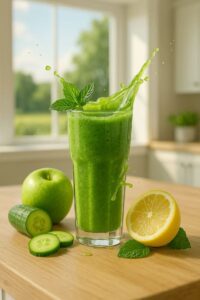
- Teens deal with both internal and environmental pressures on a daily basis, such as late nights, junk food, hormone changes, and academic pressure. All of this accumulates poisons, or “ama” in Ayurveda, which eventually show up as dull skin, oiliness, and acne.
- The body uses perspiration and urine to get rid of these poisons when it is well-hydrated. Additionally, it
- controls the production of oil.
- preserves the health of the skin’s barrier and suppleness.
- accelerates the healing of acne and cell repair
- avoids dryness, which can lead to the skin producing too much oil to compensate.
- Teens who don’t drink enough water frequently report feeling dreary, having more inflammation, and recovering from breakouts more slowly.
- What Science and Ayurveda Say
- Drinking adequate water helps maintain proper skin hydrated, maintains renal function (which is essential for detoxing), and lowers oxidative stress—all of which are variables associated with acne, according to scientific study.
- According to Ayurveda, poor digestion and an excess of pitta (heat) are frequently the cause of skin abnormalities like acne. Fresh fruit juices, buttermilk, coconut water, and other natural liquids are regarded as hydrating and cooling. They lessen skin inflammation, enhance digestion, and soothe pitta.
- For instance:
- Electrolytes and minerals like potassium and magnesium that are good for the skin are abundant in coconut water.
- Chaas, or buttermilk, aids with digestion, which is essential for managing acne.
- Natural vitamin C, which is essential for immune system function and skin repair, can be found in amla or citrus juices.
- How to Add Skin-Loving Liquids to Your Day
- Make a deliberate effort to replace aerated and sugary beverages with natural ones:
- Drink a glass of lukewarm water with lemon to start your day.
- Drink some chaas or soft coconut water in the middle of the morning.
- After school, drink at least two glasses of water.
- Savor sugar-free fresh orange or pomegranate juice in the evening.
- At least 8 to 10 glasses of fluid should be consumed each day. You may make staying hydrated enjoyable and unique by carrying a reusable bottle with stickers or drawings, or by setting adorable reminders if you forget to drink water.
- Make a deliberate effort to replace aerated and sugary beverages with natural ones:
- Real Teen Experience
- Teens who drink more water frequently say:
- Skin that is more radiant and brighter
- Reduced blackheads and whiteheads
- Quicker healing of pimples
- Reduced oiliness during the day
- The benefits of hydration extend far beyond the skin; some people even report improved attention and a decrease in sugar cravings.
- Teens who drink more water frequently say:
- Without moisture, no skincare product functions effectively. Your skin relies on this foundation. In addition to calming your body and skin, switching to natural beverages from sugary drinks has long-term benefits.
- Hydration is your daily natural defense if acne is a constant battle for you; clear skin is just a few drinks away.
7. One Vitamin-C Fruit a Day: Your Natural Skin Shield
- All it takes to begin creating healthier, clearer skin from the inside out is one fruit every day.
- Including a fruit high in vitamin C in your daily routine will help your skin fight adolescent acne by providing the antioxidant support it needs to recover, look better, and prevent more breakouts.
Why Vitamin C Is a Skin Savior
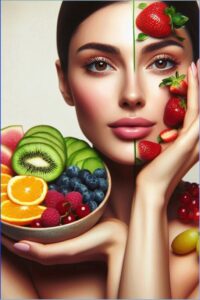
- Hormones, pollution, greasy food, school pressure, sleep deprivation, and occasionally harsh skincare products all contribute to the ongoing assault on teenage skin. Inflammation, clogged pores, and weak collagen—the protein that gives skin its strength and suppleness—are the results of this.
- Vitamin C is a strong antioxidant that:
- minimizes acne-related inflammation
- increases the creation of collagen to heal skin
- accelerates the healing of scars from acne
- improves the skin’s resistance to pollutants and UV damage.
- What’s the best part? Nature has already included this miracle vitamin in common fruits, so you don’t need pills.
- Best Fruits for Vitamin C (Teen-Friendly & Tasty)
- Teens can consume the following easily accessible and reasonably priced fruits on a daily basis:
- Amla: One of the most abundant natural sources of vitamin C is amla, often known as Indian gooseberry. Up to ten times the vitamin C of an orange is found in just one amla.
- Oranges with Sweet Lime (Mosambi): A pleasant and pitta-cooling snack or juice.
- Guava: Packed with digestive fiber, a single guava has more vitamin C than most citrus fruits.
- Strawberries: are tasty and help prevent acne. Add to smoothies or breakfast bowls.
- Papaya: Contains enzymes that help lessen the irritation associated with acne.
- Develop the practice of eating one fruit high in vitamin C each day, either as a mid-after-school snack or on an empty stomach in the morning.
- Teens can consume the following easily accessible and reasonably priced fruits on a daily basis:
- What Experts & Ayurveda Say
- Vitamin C is acknowledged by contemporary dermatology as a necessary nutrient for skin that is clear and radiant. Because of its anti-aging, healing, and brightening properties, it is a common ingredient in topical serums.
- However, ingesting it through food increases the cellular immunity of your skin.
- As a “Rasayana” (rejuvenator), according to Ayurveda, amla balances the three doshas, particularly pitta, which causes acne.
- It improves digestion, cleanses the blood, and lowers internal inflammation, which makes it perfect for adolescent skin that is prone to stress and overheating.
- Real Teen Impact
- Adolescents who adopt the “one fruit a day” routine report:
- smoother, softer skin tone
- Reduced frequency of active breakouts
- decrease in the marks left by acne
- Overall, digestion and immunity have improved.
- Within 10 to 15 days, some people even report that their “skin felt brighter,” especially when paired with improved sleep and hydration. It is a simple, tasty, and profoundly restorative habit.
- Adolescents who adopt the “one fruit a day” routine report:
- What’s happening within you is reflected in your skin. Fruits, especially those high in vitamin C, work at the root, while face cleansers and lotions operate on the surface.
- Make it mandatory to eat one fruit each day. Filters are not required.
- No fad diets. One juicy bite at a time, just a straightforward, organic step toward clear, self-assured skin.
FAQS
1. What is the main cause of teenage acne?
Teen acne is primarily caused by hormonal changes during puberty that increase oil (sebum) production. This excess oil clogs pores, leading to blackheads, whiteheads, and pimples. Stress, poor diet, and improper skincare can worsen the condition.
2. Can natural remedies really cure teenage acne?
Natural remedies may not “cure” acne instantly, but they can significantly reduce breakouts, inflammation, and scars over time. When used consistently, they support the skin’s natural healing process without harsh side effects.
3. How long does it take for natural acne remedies to show results?
It depends on the skin type and consistency of use. Many teens notice visible improvements within 2–4 weeks of following a natural routine, especially when paired with a healthy diet, hydration, and reduced stress.
4. Is junk food really bad for acne-prone skin?
Yes. Foods high in sugar, oil, and dairy can spike insulin levels and trigger hormonal imbalances, which increase acne flare-ups. Replacing junk with fruits, veggies, and liquids helps support clearer skin.
5. Does using rose water daily help reduce pimples?
Absolutely. Rose water balances skin pH, calms irritation, reduces excess oil, and has antibacterial properties. It’s gentle enough for daily use and suits most teenage skin types.
6. Can exercise or playing sports reduce acne?
Yes. Physical activity reduces stress hormones and increases blood circulation, which helps flush out toxins and delivers nutrients to the skin. Just remember to shower or wash your face after sweating.
7. Why is it recommended to use cotton cloth to clean the face?
Rough towels can irritate sensitive acne-prone skin. Using a clean, soft cotton cloth is gentler and reduces the risk of spreading bacteria or causing microtears.
8. Should teenagers avoid all skincare products?
No. Teens should avoid harsh, alcohol-based, or comedogenic products. But gentle cleansers, hydrating gels, natural toners (like rose water), and lightweight moisturizers can be part of a healthy skincare routine.
9. What role does hydration play in acne prevention?
Hydration flushes out toxins, balances oil production, and keeps skin supple. Drinking water, coconut water, buttermilk, and fresh juices can improve skin clarity and reduce inflammation naturally.
10. Can eating one vitamin-C-rich fruit really help with acne?
Yes. Fruits like amla, orange, guava, and papaya are packed with vitamin C, which boosts collagen, fades acne scars, and supports the immune system — all key to healthier skin.
